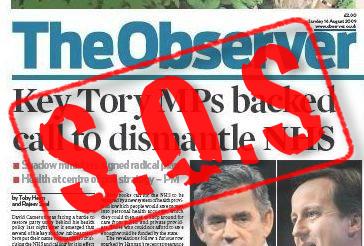Jeff Jarvis is revealing some of the work he and his students have been doing at the City University of New York on New Business Models for News. He posts about some of the new expectations publishers should have if they expect to compete in the flattened information landscape of the future.
Among them are to partner with sites that can deliver traffic in sufficient volume to support advertising. “In the link economy, value is created by he who creates content and she who delivers audience,” Jarvis writes. Another new rule is to look at the website as a platform, not a newspaper. He notes that some of the world’s largest news organizations have application programming interfaces that developers can use to plug into their sites and to repurpose content elsewhere.
Publishers should also specialize coverage to draw small but highly engaged audiences. Finally, adopt the tactics of social networking sites, which facilitate communication between their members. Jarvis points to some recent number-crunching by Martin Langeveld that demonstrates that the Newspaper Association of America’s much ballyhooed newspaper Web traffic statistics are but a rounding error compared to traffic to really big websites. When you look at the amount of time people spend on newspaper sites, the news is even worse.
Applications to the Columbia Graduate School of Journalism are up 38%, and the flood of interest in journalism education isn’t confined to New York City, reports the CJR blog. “At the University of Maryland’s journalism school, applications increased 25 percent; at Stanford, they jumped 20 percent; at NYU they were up 6 percent.” The editors ask why the sudden surge of interest in these programs at a time of cutbacks and crisis for mainstream media? Only two comments so far. Please add your own.
Britain is looking for the first time at the possible loss of a major newspaper, and last-ditch efforts are under way to save it. The 218-year-old Observer is reportedly being evaluated for closure by its owner, the Guardian Media Group. Editors Weblog tells of a campaign called “Observer SOS” that’s being mounted by the Press Gazette, a small monthly magazine for journalists. Former European Minister Denis MacShane has also written letters to 100 Members of Parliament urging them to sign a letter to the paper’s owner imploring it to continue publishing the Observer. Press Gazette also says that the the Birmingham Post may be the first major UK daily to reduce frequency. Its editor says that going weekly is probably the best option for survival.
Is the free daily newspaper model really invalid, as the Financial Times said last week? Piet Bakker begs to differ. The author of one of the best blogs about free newspapers says the reason Rupert Murdoch is closing thelondonpaper is because London already has three other free dailies, in addition to a dozen paid newspapers. There are only so many commuters to read them, Bakker notes, and recessions tend to hit free-subscription titles the hardest. “There certainly is room for a free paper as the young urban non-paid audience is growing and still valuable for advertisers,” he writes. “Room for one at least and two perhaps, but not for three or four.”
You probably know of Roger Ebert as a legendary film critic, but did you know he is also an alcoholic? Ebert reveals this little-known fact (Wikipedia’s Ebert entry has no mention of it) in a long blog post marking his 30th year of sobriety. It’s a remarkable piece of writing by a man who has had more than his share of struggles the last few years. Ebert writes glowingly of the value of Alcoholics Anonymous in his victory over alcohol and shares a few memories of notable meetings in the people in them. Our favorite:
I was on a 10 p.m. newscast on one of the local stations. The anchor was an A.A. member. So was one of the reporters. After we got off work, we went to the 11 p.m. meeting at the Mustard Seed. There were maybe a dozen others. The chairperson asked if anyone was attending their first meeting. A guy said, “I am. But I should be in a psych ward. I was just watching the news, and right now I’m hallucinating that three of those people are in this room.
Comments
This entry was posted on Wednesday, August 26th, 2009 at 1:31 pm and is filed under Facebook, Hyper-local, Solutions. You can follow any responses to this entry through the RSS 2.0 feed. Both comments and pings are currently closed.




Larry Levy: I’ll be there right after my AA meeting.
Griffin Mill: Oh Larry, I didn’t realize you had a drinking problem.
Larry Levy: Well I don’t really, but that’s where all the deals are being made these days.
The Player, 1992